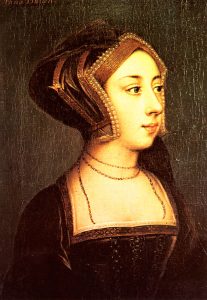 On this day in history, 29th January 1536, on the same day that her predecessor Catherine of Aragon was buried, Anne Boleyn suffered a miscarriage. The imperial ambassador, Eustace Chapuys, recorded:
On this day in history, 29th January 1536, on the same day that her predecessor Catherine of Aragon was buried, Anne Boleyn suffered a miscarriage. The imperial ambassador, Eustace Chapuys, recorded:
“On the day of the interment the Concubine had an abortion which seemed to be a male child which she had not borne 3½ months, at which the King has shown great distress. The said concubine wished to lay the blame on the duke of Norfolk, whom she hates, saying he frightened her by bringing the news of the fall the King had six days before. But it is well known that is not the cause, for it was told her in a way that she should not be alarmed or attach much importance to it. Some think it was owing to her own incapacity to bear children, others to a fear that the King would treat her like the late Queen, especially considering the treatment shown to a lady of the Court, named Mistress Semel [Seymour], to whom, as many say, he has lately made great presents.”
Although Nicholas Sander wrote in Elizabeth I’s reign that “brought forth only a shapeless mass of flesh”, contemporary accounts make no mention of there being anything unusual about the foetus. You can read more about this in my article Anne Boleyn’s final pregnancy.
The miscarriage must have been a huge blow for Anne and Henry VIII and I do think that this event made Anne vulnerable. What do you think?
As I said, on this same day, Catherine of Aragon was buried at Peterborough Abbey and you can read more about her burial in 29 January 1536 – The Burial of Catherine of Aragon.